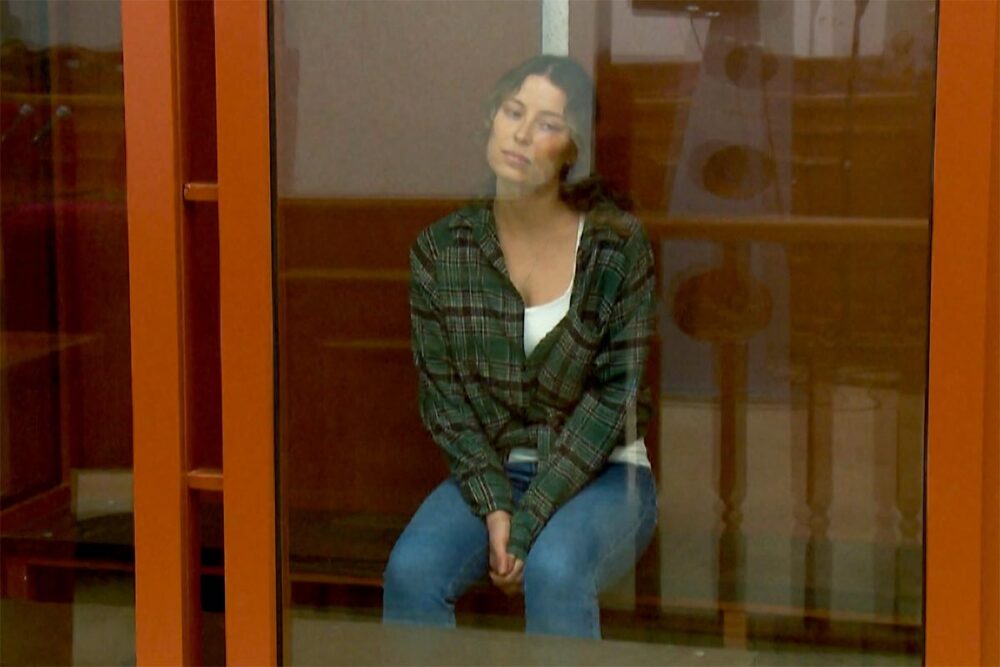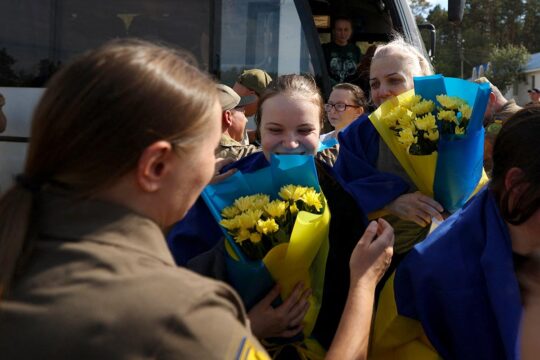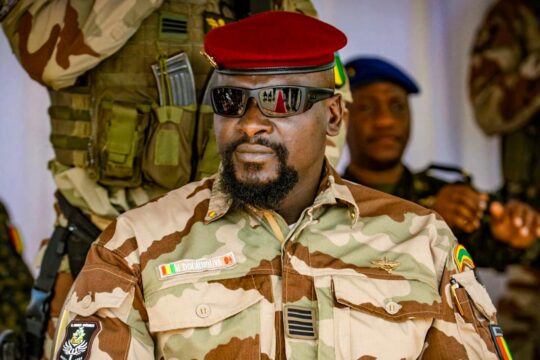In Russia, criminal cases for treason have gradually increased since the full-scale invasion of Ukraine and are already at a record high, with 48 sentences pronounced since the start of this year. According to the Judicial Department of the Supreme Court, Russia convicted 39 people under treason charges in 2023. In 2022, there were only 16 convictions.
In July 2022, the treason law was amended to include actions related to siding with an enemy during armed conflict or military actions against Russia. In April 2023, the maximum penalty for treason was increased from 20 years to life imprisonment. “Since 2023, investigators have started pursuing cases under a previously dormant form of treason –namely, ‘activities against the security of Russia’. The FSB [Federal Security Service, an executive authority specializing in counterterrorism and state security] interprets this to include monetary transfers, posting leaflets, sending photographs, committing terrorist acts or sabotage, and other support for Ukraine,” explains Evgeny Smirnov, a lawyer with the human rights project First Department, which specializes in espionage and treason cases.
Alena Savelieva, a lawyer who has been studying court practices in treason cases, says that since the summer of 2022, the FSB has begun to issue warnings – most often by inviting people to its regional offices for interviews – to citizens who transferred money to Ukrainian funds or organizations. Following these so-called “preventive measures”, the first cases for donations to Ukraine began to appear.
In the first half of 2024, Russia handed down 48 convictions for treason or attempted treason, Justice Info calculated, based on media analysis and government reports. Out of these, 44 cases, or 92%, were related to actions in favour of Ukraine. Russian citizens are being prosecuted not only in border areas (such as Rostov-on-Don, Voronezh, and Belgorod regions, or occupied Crimea) but all over the country, including in remote regions like Amur (8,600 km from Moscow) and Khanty-Mansi Autonomous Okrug (2,600 km from Moscow).
Three stories of treason
Most often, cases of treason due to actions in favour of Ukraine are initiated on three charges: joining (or planning to join) the enemy, providing financial support to the Ukrainian Armed Forces, or passing on information about the location of Russian troops.
In joining the enemy, the case materials often mention three armed formations: The Freedom of Russia Legion, the Russian Volunteer Corps, and the Siberian Battalion. The first one, also the most well-known, became part of the Ukrainian Armed Forces in March 2022. It mainly consists of Russians. It is known for its raids, launched from Ukraine, in the Belgorod and Kursk regions in the summer of 2023 and spring of 2024: several times its units managed to break through the Russian border. In March 2023, the Russian Supreme Court qualified the Legion as a terrorist organization and banned its activities in the country.
In April 2024, 19-year-old Vyacheslav Kulikov from the Lipetsk region in western Russia was sentenced to nine years in prison. The investigation claimed that he had sent a PDF file with his personal details to several Ukrainian organizations. He was recruited by The Freedom of Russia Legion, which initially offered him a vetting process. The Russian investigation alleges that Kulikov chose to set fire to the runway of a military airfield near Lipetsk, as his test assignment. He received detailed instructions from national guard supervisors in Kyiv on how to make Molotov cocktails. After carrying out several acts of sabotage in the Lipetsk region, Kulikov planned to travel to Ukraine via Georgia. He was arrested in February 2023. Kulikov was charged not only with attempting treason but also attempting to commit a terrorist act and participating in a Ukrainian armed formation.
Russians are also accused of transferring funds to Ukrainian charities. Such cases often arise fortuitously, for example when someone undergoes additional checks at the border. This was the case for 19-year-old Danil Yefimov. On July 3, 2024, he received a 12-year prison sentence in a strict regime colony for transferring money to the Ukrainian charity fund of Sergey Prytula.
In late December 2023, Yefimov, along with his father and girlfriend, flew from Volgograd to Turkey to celebrate the New Year. At that time, the young man only had a Ukrainian international passport – he had a Russian internal passport, but he hadn’t received the international one yet. This attracted the attention of border officials, who took him to an interrogation room, confiscated his mobile phone, and found several transfers to a Ukrainian fund in his banking app. Yefimov was immediately detained.
The court’s verdict states that after the start of the war, he was “constantly in a state of stress”, and was worried about his relatives and friends in Ukraine. He was continually reading news about alleged Russian military crimes, and his relatives shared similar stories. “Under the influence of these publications and information from relatives and friends, he developed a mistaken impression of the Ukrainian armed forces, its paramilitary units, and the necessity of supporting the Ukrainian army,” the judgment says.
Not much is known about the cases initiated because of the transfer of data on the deployment of Russian troops. Most often the defendants are ordinary citizens, and their detention does not become known immediately, sometimes not until the stage of sentencing. The media write about such cases with references to FSB press releases. For example, in May 2024, a court in Zabaikalsky Krai (eastern Russia, 6,100 kilometres from Moscow) sentenced a local resident, Suleimanova (her first name is not given by the FSB), to 12 years in prison. According to the investigation, she collected and transmitted information about the movements of Russian military personnel and units in Zabaykalsky Krai who were being prepared for deployment to the “special military operation” zone.
In the spring of this year, Georgy Kamlash, a resident of Samara, received a 13-year sentence in a strict regime colony. He was found guilty of providing information to Ukraine about military equipment movements through the Samara region (Volga Federal District, 1,000 km from Moscow) in the first part of 2023, after taking photographs of railway stations Kinel and Bezymyanka and sending them with comments to the Ukrainian Armed Forces via a messaging app.
Charges against scientists
Before the war, Russian courts often tried scientists under the charge of treason. According to lawyer Savelieva, the number of cases involving scientists hasn’t decreased – but these cases have been overshadowed by the ongoing surge in “Ukrainian cases”. Cases involving scientists are reviewed much longer and often result in harsher sentences of 15-20 years, she notes. “I can relate this to the difficulty in proving. For Ukrainian cases, correspondence about views, intentions, or information about transfers to Ukraine is enough; scientists are more complicated,” she explains.
Savelieva’s observations are supported by statistics. One of the four non-Ukrainian related convictions in 2024 was the sentence of 77-year-old scientist Anatoly Maslov. Doctor of Physical and Mathematical Sciences and professor at Novosibirsk State Technical University, Maslov was detained in June 2022. According to the FSB, in 2014 Maslov provided German intelligence with information on classified scientific developments. The prosecution of the plasma physics and chemistry specialist is linked to his research on hydrocarbon fuels for aircraft. Maslov denied the accusations, but the Court sentenced him to 14 years in a strict regime colony.
“Anyone is at risk now”
One of the high-profile treason cases in recent months involves Russian-American citizen Ksenia Karelina Khavana. According to human rights defenders, her case is linked to a February 24, 2022 transfer of $51.8 from her American bank account to an American fund helping Ukraine. Upon returning to Yekaterinburg from Los Angeles in the winter of 2024, she was initially detained on an administrative case and later charged with treason. Now her case is being considered by the Sverdlovsk regional court in closed session.
Legal experts believe that the surge is yet to come. “From a person’s arrest on treason charges to the sentencing, it often takes a year and a half to two years. From 2014 to 2022, the average number of cases was around 15 annually. In 2022, there was an increase to several dozen, and the explosive growth occurred in 2023,” explains Smirnov. According to his estimates, the FSB initiates between 150 and 220 cases per year. “Now, investigators from any region can handle these cases. Before the full-scale invasion, only special departments dealt with them,” he says. “Unlike the pre-war period, it is impossible to single out groups that risk being targeted; now, treason charges are brought against scientists, officials, housewives, schoolchildren, and military personnel. Anyone is at risk now.”







